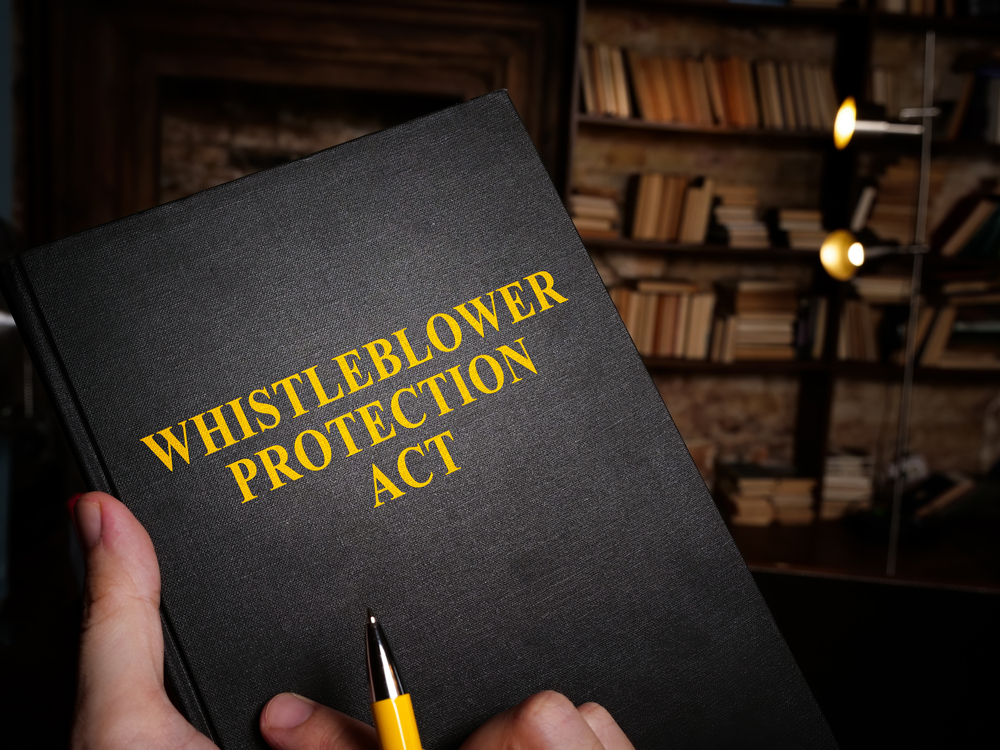Summary
Why Hire HHK for Your Whistleblower Lawsuit?
If you suspect wrongdoing or fraud and want to come forward but fear losing your job or other repercussions, the accomplished whistleblower attorneys at Herman Herman Katz can help. Although your rights as a formal whistleblower are protected, your employer might still choose to retaliate. A lawsuit is your next step, and our attorneys can help you seek reinstatement, back pay with interest, and legal fees. If you find yourself in a whistleblower situation, we’ll protect your rights and ensure you’re rewarded for your efforts.
What Is a Whistleblower?
Individuals who are brave enough to speak up when they see fraud or wrongdoing are called whistleblowers. Fraud or wrongdoing could be a violation of any Federal law, rule, or regulation, a gross waste of funds or mismanagement, an abuse of authority, or a substantial and specific danger to public health or safety.
What Is a Whistleblower Lawsuit?
A whistleblower usually – but not always – works for or around the offending organization and can gather crucial insider details about the fraud or wrongdoing. Whistleblower lawsuits help ensure dishonest businesses and industries don’t get away with defrauding the government and creating unsafe situations.
Whistleblower lawsuits are possible thanks to the False Claims Act, enacted in 1863 in response to defense contractor fraud during the Civil War. This law prohibited the intentional filing of a false claim against a federal program.
Filing a whistleblower lawsuit requires a competent law firm with a strong background in handling cases under the False Claims Act. The experienced whistleblower lawyers at Herman Herman Katz have been fighting for the rights of hard-working employees in Louisiana and beyond for over 80 years and can assist with whistleblower lawsuits.
Types of Whistleblower Cases
So many of our country’s most vital programs and services rely on federal funding and taxpayer dollars to function. These programs were founded on noble intentions of helping every American live a better life.
Here are just a few examples of what your tax dollars pay for and that have involved whistleblower lawsuits:
- Medicare/Medicaid
- The Affordable Healthcare Act
- Social Security
- FEMA (Federal Emergency Management Agency)
- Environmental protection
- Defense spending and national debt
- Veterans’ benefits
There are also countless businesses and industries, such as hospitals and nursing homes, construction firms, transportation, pharmaceuticals, education, and more, that operate based on the needs of the public.
Here are some of the most common whistleblower cases.
Medicare Fraud at Hospitals
Hospitals and home health agencies are trusted to use public funds appropriately. They are reimbursed with Medicare and Medicaid funds. This type of fraud depends on patients not knowing their rights.
Examples of fraud at hospitals include:
- Inadequate care
- Billing for care not received
- Overcharging for care
- Misrepresenting the services provided
- Skewing forms or data used to allocate money
Unsurprisingly, hospital Medicare fraud is the most prevalent type and costs the U.S. tens of billions of dollars every year.
Nursing Home and Hospice Fraud
The elderly and dying are our most vulnerable citizens. The fraud they experience is similar to that found in hospitals, but the more private setting makes it easier to get away with. Failure to provide a clean and safe environment, giving dangerous medications without patient consent, targeting non-terminal patients for hospice services, and even stealing medication are just a few examples of nursing home and hospice fraud.
Pharmaceuticals and FDA Fraud
Pharmaceutical companies and unscrupulous doctors often work together to bypass the strict safety regulations established by the U.S. Food and Drug Administration (FDA), hoping to profit by scamming consumers. They market and recommend products that claim to work but have not been proven safe or effective. Other examples of FDA and pharmaceutical fraud include cutting corners on quality control, offering doctors money or vacations to prescribe certain drugs (kickbacks), and switching a patient’s prescription to a less expensive drug before charging Medicare for the more expensive one.
Department of Defense Fraud
Companies under contract to manufacture vehicles, weapon systems, uniforms, and more for the U.S. military have plenty of ways to abuse funds. The abuse of funds can happen at massive entities like global security and aerospace company Lockheed Martin or less obvious ones like small parts suppliers and custodial companies. There are many ways fraud is committed against the Department of Defense, such as overcharging for services, installing defective parts, skirting inspections, and shifting costs from fixed-price contracts to the more lucrative cost-plus without proper justification.
IRS Tax Fraud
While tax fraud often brings to mind dishonest politicians, it’s common among businesses and individuals trying to evade paying their share. Ways to defraud the IRS include:
- Claiming false exemptions
- Submitting falsified documents
- Not reporting all income
- Failing to withhold
- Organized crime
Combined, IRS fraud amounts to around $400 billion annually. The number of claims under the Tax Whistleblower Program increases every year.
Environmental Fraud
This is much more than dumping illegal toxins under the cover of darkness. For example, when a routine manufacturing plant inspection reveals contamination levels over the legal limit, the site owner might bribe a laboratory employee to falsify the results. Other examples of environmental fraud include marketing fraud, false insurance claims, and inflated invoices.
FEMA Fraud
Both homeowners and outside contractors may attempt FEMA scams. The homeowner might file a claim in someone else’s name or submit a home that was never damaged. Dishonest contractors may cold call homeowners, offering assistance in exchange for personal information or asking for payment before beginning repairs.
SBA Fraud
The Small Business Administration (SBA) was created to encourage Americans to open small businesses, which preserves free enterprise competition and strengthens the economy. It offers counseling, money to open the business, and assistance in finding good contractors and vendors. Identity theft, claiming fake businesses or employees, and misusing funds are common ways business owners have scammed the SBA.
During the coronavirus pandemic, mass government fraud occurred through the SBA. After receiving a $738 million loan to handle the unprecedented flood of applications from struggling businesses, the agency subcontracted a big chunk of the labor to other companies. They were still paid nearly half of that money, but just six employees worked on the claims in 2020.
Importance of Whistleblowers
Unfortunately, the management and employees of public, government, and private programs and businesses don’t always have the best interests of the people they serve. Wrongdoing in various industries and attempts to defraud the federal government happen every day, and so many of them could go unnoticed and unpunished without the help of whistleblowers.
Courageous whistleblowers who came forward in these areas have saved the American public from harm. They’ve also kept the country from losing billions more than if the crimes had gone unchecked.
Frequently Asked Questions
There is a provision in the False Claims Act that allows whistleblowers to sue the wrongdoers and recoup a percentage of whatever compensation the government recovers. This is called “qui tam” and essentially means a private citizen is filing a lawsuit on behalf of the U.S. government. In any qui tam, the government can choose whether to join the lawsuit. The whistleblower may continue if the government declines. Fraud in qui tam actions means the intentional, significant theft or misuse of taxpayer money.
Exposing fraud does not automatically mean you will be rewarded. To apply for formal whistleblower status, you must be in compliance with the definitions and procedures of whistleblower law, which is designed to protect you. Luckily, a growing number of these laws are now in effect at local, state, and federal levels.
The False Claims Act sparked several subsequent laws about whistleblowers. The Whistleblower Protection Act of 1989 protects federal employees who disclose information with reasonable evidence of fraud. It was intended to eliminate wrongdoing in the government by prohibiting negative consequences from befalling whistleblowers – mainly employer retaliation.
If you obtain formal whistleblower status, you are legally protected from retaliation by your employer. Retaliation refers to “adverse action” taken against the whistleblower, such as discrimination, harassment, suspension, or termination. Other, more subtle retaliation might include denying overtime, leaving the employee out of important meetings, mocking the employee, or implying poor performance when there was none. Fear of these adverse actions might keep the whistleblower quiet.
Even Mark Felt, known as “Deep Throat” and arguably the most famous whistleblower in history, had an attorney when he brought down the Nixon administration after Watergate. The massive scope of filing a lawsuit on behalf of the American government, along with the complicated path to whistleblower status and rewards, makes having a competent whistleblower lawyer essential.
If you suspect wrongdoing or fraud and want to come forward but fear losing your job or other repercussions, the accomplished whistleblower attorneys at Herman, Herman & Katz can help. Although your rights as a formal whistleblower are protected, your employer might still choose to retaliate. A lawsuit is your next step, and our attorneys can help you seek reinstatement, back pay with interest, and legal fees. If you find yourself in a whistleblower situation, we’ll protect your rights and ensure you’re rewarded for your efforts.
Medicare fraud involves intentionally submitting false or misleading information to the Medicare program for financial gain. This could include submitting claims for services or treatments that were not provided, inflating the cost of services, or engaging in other deceptive practices.
A whistleblower lawsuit, also known as a qui tam lawsuit, is a legal action filed by an individual (the whistleblower) who has inside knowledge of fraudulent activities, often within a healthcare organization. Whistleblowers file these lawsuits on behalf of the government to help recover funds lost due to fraud.
Whistleblowers can be individuals with direct knowledge of fraudulent activities, such as healthcare employees, administrators, billing specialists, or patients who have witnessed Medicare fraud.
A whistleblower lawsuit begins with filing a complaint in a federal court. The government can investigate the allegations and decide whether or not to join the case. If successful, the whistleblower may receive a portion of the recovered funds as a reward.
According to the False Claims Act, a lawsuit must be filed within the latter of these two periods: six years from the Act violation date or three years after the government becomes aware of the violation, with the maximum being ten years after the Act violation. The “first to file” principle underscores the importance of promptly filing a qui tam lawsuit, as only the initial filer qualifies for a reward, irrespective of the lawsuit’s adherence to the statute of limitations.
Free Case Evaluation
Related Practice Areas
Whistleblower Law Attorneys
Recent Whistleblower Law News
Lawsuits involving Medicare fraud are making headlines regularly. Investigators frequently expose and charge people with healthcare fraud, yet billions are still lost each year.
In 2012, Tax Court Rule 345 was adopted to allow […]




